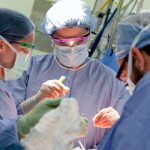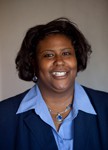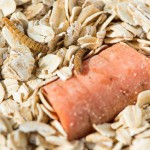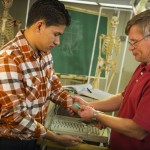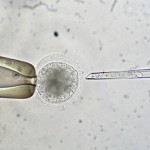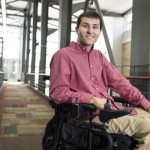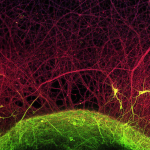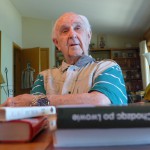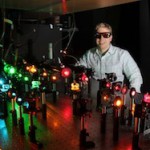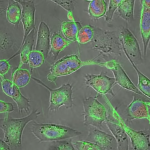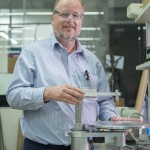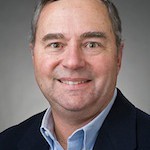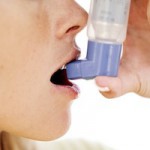Tag School of Medicine and Public Health
Accuracy in radiation firm with ties to UW marks 25 years in Middleton
In 1989, Ed Neumueller — who had been general manager of a company established by UW–Madison faculty member John Cameron — helped found Standard Imaging in Middleton to build quality assurance products for radiation delivery machines used in cancer treatment. The company is marking its 25th anniversary this year.
Innovative teaching practices encourage students in STEM
Like many seniors majoring in biology, Christian Hernandez is pursuing the pre-med track. However, he nearly didn’t make it past his freshman year at the University of Wisconsin–Madison As a Latino first-generation college student, Hernandez says he had no role models to help him achieve his career goal: to change the face of medicine in the United States. But then he took Physiology 335.
Neal First, whose work led to cattle cloning, dies at 84
Emeritus Professor Neal First, a pioneer in cattle reproduction and cloning who studied animal physiology at the University of Wisconsin–Madison for 45 years, died Nov. 20 from complications of cancer.
UW-Madison awarded $8.3 million for new urological research center
The University of Wisconsin–Madison has been awarded an $8.3 million grant from the National Institutes of Health to create a research center focused on urological health. The George O’Brien Center at UW–Madison is a collaboration with the University of Massachusetts-Boston to enhance the diagnosis and treatment of male urinary symptoms associated with hormones, aging, obesity and benign prostate enlargement.
Alumnus finds passion for patient advocacy after accident
When Jeff Mahlum suffered a spinal cord injury during a diving accident in 2011 that left him paralyzed from the chest down, he had the unfortunate opportunity to learn how confusing and daunting the health care system can be. Having graduated with a major in biology from the UW in 2013, Mahlum decided to use the gap year between undergraduate and medical school to learn more about how he could understand the needs of his future patients. Mahlum, who’s now enrolled at the UW School of Medicine and Public Health, discovered patient advocacy and the Center for Patient Partnerships.
Cool Science Image collection debuts at McPherson Eye Research Vision Gallery
The winning images from the 2014 Cool Science Image (CSI) contest will be on display beginning Sept. 2 at the Mandelbaum & Albert Family Vision Gallery, part of the McPherson Eye Research Institute.
Legend in genetics at forefront of book about heroism during 20th century’s darkest hours
Waclaw Szybalski, 92, a genius of genetics who has been repeatedly mentioned as a candidate for the Nobel Prize, grew up as an aspiring scientist during World War II in the eastern part of Poland. Many of Szybalski's most significant wartime roles concerned a decidedly applied type of science: He cooked TNT so the Polish resistance could sabotage rail lines. He participated in smuggling typhus vaccine to Jews in the Warsaw Ghetto. And he fed lice and supervised "louse feeders."
Shaw awards go to two UW researchers
One scientist studying how HIV spreads in the body and another examining cellular machinery and its role in disease have earned funding from the Greater Milwaukee Foundation to advance their research.
New tumor-targeting agent images and treats variety of cancers
Scientists at the University of Wisconsin Carbone Cancer Center (UWCCC) report that a new class of tumor-targeting agents can seek out and find dozens of solid tumors, even illuminating brain cancer stem cells that resist current treatments.
Mackie to receive highest honor in medical physics
Thomas "Rock" Mackie, director of medical engineering at the Morgridge Institute for Research, will receive the highest honor in the field of medical physics for his far-reaching contributions to medical imaging.
Dane County African-Americans have high cancer rates
African Americans in Dane County were 30 percent more likely than whites to be diagnosed with cancer.
National Academy of Sciences adds three UW–Madison researchers
Three University of Wisconsin–Madison faculty members have been elected to the National Academy of Sciences, the organization announced today.
Annual Wisconsin Stem Cell Symposium to focus on blood
World stem cell leaders will converge on Promega's BioPharmaceutical Technology Center in Fitchburg on April 30 for the 9th Annual Wisconsin Stem Cell Symposium: From Stem Cells to Blood.
Research team to search for new antibiotics from untapped microbes
Facing an imminent global public health crisis, a University of Wisconsin–Madison research team has been awarded up to $16 million from the National Institutes of Health to find new sources of antibiotics to combat the rising number of deadly antibiotic-resistant infections.

